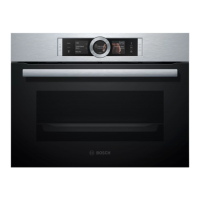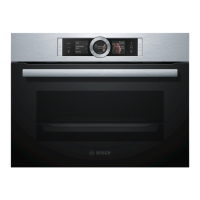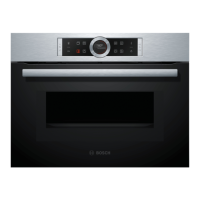Do you have a question about the Bosch CSG656B.1B and is the answer not in the manual?
Overview of hazards including fire, burns, scalding, injury, electric shock, and magnetism.
Explains damage from incorrect use of accessories, foil, water, and door handling.
Warns about scalding, injury, and fire risks associated with steam functions.
Warns about burns and hot exterior surfaces during the cleaning function.
Tips to reduce energy consumption, such as proper preheating and using suitable cookware.
Guidelines for disposing of packaging and the appliance according to WEEE directive.
Introduces the appliance's control panel, buttons, touch fields, and rotary selector.
Explains the function of various buttons and touch-sensitive controls on the panel.
Describes how to use the rotary selector for setting values and navigating menus.
General overview of how individual controls are adapted for appliance functions.
Explains how the display is structured and how values are highlighted.
Details the dual role of touch-screen displays as visual indicators and input controls.
Explains how the display ring indicates selection list position and countdowns.
Describes how the cooking compartment temperature is shown graphically.
Explains the heating line's function in showing the heating-up progress.
Describes the indicator that shows residual heat after the appliance is switched off.
Introduces the various operating modes available for easier appliance use.
Details the different heating types and their applications for cooking dishes.
Explains normal operating noises related to the pump and control panel.
Describes noises associated with the control panel during steam operations.
Explains the benefits and process of steaming food for gentle cooking.
Details how to use the dough proving function for faster and better dough fermentation.
Explains the use of the defrosting function for frozen food items.
Instructions on how to fill the water tank for steam operations, including safety warnings.
Guide on how to set and manage the cooking time for various operations.
Instructions on how to delay the end of a cooking operation.
Explains how to use the independent timer function for various purposes.
Steps to enable or disable the childproof lock feature to prevent accidental changes.
Guide on how to modify various default settings for personalized appliance operation.
Overview of accessible basic settings such as language, clock, and water hardness.
Instructions for adjusting the clock display and time settings.
Recommends appropriate cleaning agents for different appliance surfaces to avoid damage.
Details the types of surfaces within the cooking compartment and their cleaning methods.
Instructions for cleaning smooth enamel surfaces, including what to avoid.
Explains how the EcoClean function cleans the self-cleaning surfaces in the cooking compartment.
Steps to take before starting the cleaning function, including removing accessories.
Guidance on cleaning the compartment floor and interior of the appliance door.
Details the process and importance of regular descaling for optimal appliance performance.
Instructions for removing and reattaching the oven rails for cleaning.
Step-by-step guide on how to remove and reattach the oven door for cleaning or panel replacement.
Instructions for disassembling and reassembling the appliance door panels.
A guide to identifying and resolving common appliance faults before contacting service.
Explains how to handle error codes displayed on the appliance.
Information on the automatic shut-off feature after prolonged operation.
Details about the interior lighting and when to contact service for replacement.
Explains where to find the appliance's E and FD numbers for service inquiries.
Contact information and guidance for scheduling service visits or seeking product advice.
Guide on how to navigate categories and select dishes for preparation.
Instructions on how to set parameters for selected dishes, including weight and temperature.
How to extend cooking time if the result is not satisfactory.
How to schedule the cooking to finish at a specific later time.
Advice on using silicone moulds, their limitations, and unsuitability for steam.
Provides recommended settings and tips for various baking recipes.
Explains how steam assistance improves baking results for certain items.
Guidance on selecting the correct shelf positions for optimal baking results.
Information on suitable accessories for baking and how to use them.
Advice on choosing the best type of baking tins for optimal browning and baking time.
Guidelines for using greaseproof paper correctly during baking.
A table detailing ideal heating types, temperatures, and times for various baked goods.
Common baking issues and solutions, like cake collapsing or uneven browning.
General advice and ideal settings for roasting poultry and meat.
Benefits of roasting on the wire rack for crispy results.
Convenience and methods for roasting meat using various types of cookware.
How steam assistance improves roasting results by keeping food moist and glossy.
Information on using the grill function for poultry, meat, fish, and toast.
Explains the suitability of circulated air grilling for various meats and poultry.
Tips for grilling flat items like steaks and burgers for even browning.
Advice on cooking fish whole, including placement and checking for doneness.
Step-by-step instructions for making homemade yogurt using the appliance.
Explains energy-saving heating functions like Hot air eco and Top/bottom heating eco.
Advice on reducing acrylamide formation during high-temperature cooking.
Details the benefits and methods of slow cooking for tender meat dishes.
Instructions on using the 4D hot air function to dry fruits, vegetables, and herbs.
Guidance on preserving fruits and vegetables, including jar preparation and juicing methods.
Instructions for sterilising baby bottles and preserving jars using the appliance.
Details the two-stage proving process for yeast dough to achieve optimal results.
How to defrost frozen fruit, vegetables, and baked items using specific heating types.
Instructions for gently reheating food using steam to maintain taste and texture.
Using the "Keeping warm" function with different moisture levels to prevent dishes from drying out.
Tables provided for test institutes, offering detailed settings for various dishes.
| Product Type | Oven |
|---|---|
| Oven Type | Built-in |
| Clock | Yes |
| Number of Cavities | 1 |
| Heat Source | Electric |
| Voltage | 220-240 V |
| Installation Type | Built-in |
| Color | Black |
| Cooling Fan | Yes |
| Child Lock | Yes |
| Timer | Yes |
| Programmable | Yes |
| Warranty | 2 years |
| Included Accessories | Baking tray, Wire rack |
| Frequency | 50 Hz |











